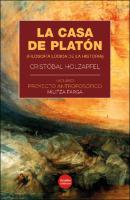La casa de Platón
Filosofía lúdica de la historia
| dc.contributor.author | Holzapfel, Cristóbal | |
| dc.contributor.author | Farga, Militza | |
| dc.date.accessioned | 2022-12-08T10:54:05Z | |
| dc.date.available | 2022-12-08T10:54:05Z | |
| dc.date.issued | 2022 | |
| dc.identifier.uri | https://library.oapen.org/handle/20.500.12657/59879 | |
| dc.description.abstract | On the basis of conceiving the human being as a player, homo ludens, we can contemplate the history of humanity as the history of a certain type of game, namely the game of agon, the game in which different abilities, skills or abilities face each other. , individual or collective, against others. And the agonal game, which we play daily, is so decisive that it should be noted that specific games, physical or mental games, from soccer to chess, constitute like a ritual, the celebration of our agonal being. Although in ancestral cultures the agon was perfectly delimited, like the agon of the potter, the farmer or the warrior, from the moment that, in Greece, with the beginning of western philosophy, the transition from myth to reason was undertaken, the agon has to become rational and with this it will be strengthened more and more until our days. | en_US |
| dc.language | Spanish | en_US |
| dc.subject.classification | thema EDItEUR::Q Philosophy and Religion::QD Philosophy::QDT Topics in philosophy::QDTS Social and political philosophy | en_US |
| dc.subject.other | Philosophy, History, Politics, playful thinking | en_US |
| dc.title | La casa de Platón | en_US |
| dc.title.alternative | Filosofía lúdica de la historia | en_US |
| dc.type | book | |
| oapen.identifier.doi | 10.26448/ae9789566095699.54 | en_US |
| oapen.relation.isPublishedBy | f6cb5ffd-d9ed-409f-b6f8-71eb0272e363 | en_US |
| oapen.pages | 344 | en_US |
| oapen.place.publication | Santiago, Chile | en_US |

